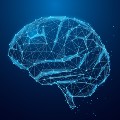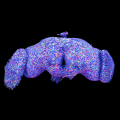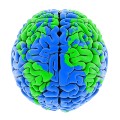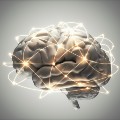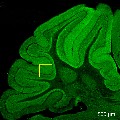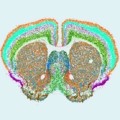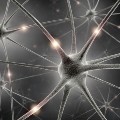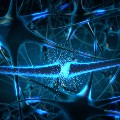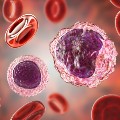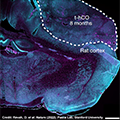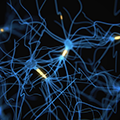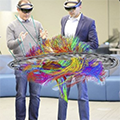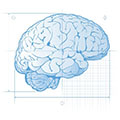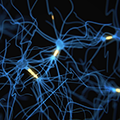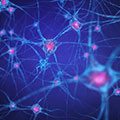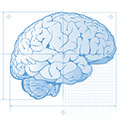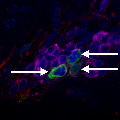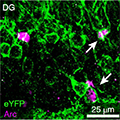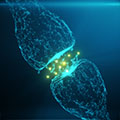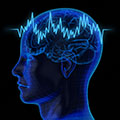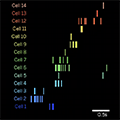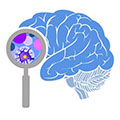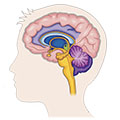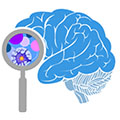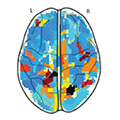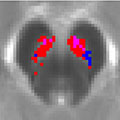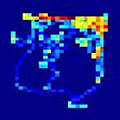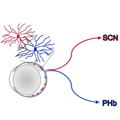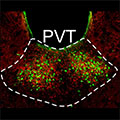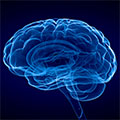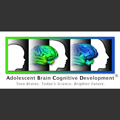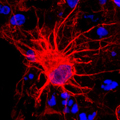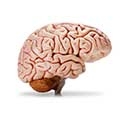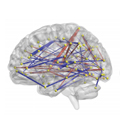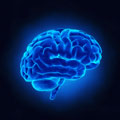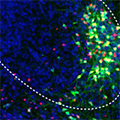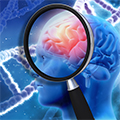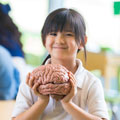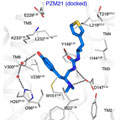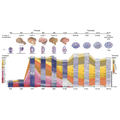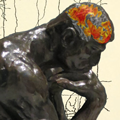Science Updates About Brain Anatomy and Physiology
- Brain Connectivity Linked With Cognition in People With Early Psychosis
-
An NIMH-funded study identified consistent links between brain connectivity and cognitive function in people with early stage psychosis and people at high risk who later developed psychosis.
- Researchers Fully Map Neural Connections of the Fruit Fly Brain
-
A scientific team supported by the National Institutes of Health (NIH) unveiled the first complete map of the neural connections of the common fruit fly brain.
- Youth With Conduct Disorder Show Widespread Differences in Brain Structure
-
The largest neuroimaging study of conduct disorder to date, with funding from NIH, has revealed extensive changes in brain structure among young people with the disorder. The largest difference was a smaller area of the brain’s outer layer, known as the cerebral cortex, which is critical for many aspects of behavior, cognition and emotion.
- Noninvasively Stimulating Deep Brain Areas to Treat Depression Symptoms
-
In a new neuroimaging study funded by the National Institute of Mental Health, researchers used repetitive transcranial magnetic stimulation to target regions deep in the brain to help reduce depression symptoms.
- Understanding the Underpinnings of Sensory Hypersensitivity in SCN2A-Associated Autism
-
In this NIMH-supported study, researchers investigated the neural underpinnings of sensory hypersensitivity in SCN2A-associated autism.
- Study Reveals Potential Neural Marker for Social Impairment in Psychotic Disorders
-
Research funded by NIMH found a link between a low level of social interest among people with psychotic disorders and brain regions in the social motivation system.
- Scientists Unveil Complete Cell Map of a Whole Mammalian Brain
-
For the first time ever, an international team of researchers has created a complete cell atlas of a whole mammalian brain.
- Scientists Unveil Detailed Cell Maps of the Human Brain and the Nonhuman Primate Brain
-
A group of international scientists have mapped the genetic, cellular, and structural makeup of the human brain and the nonhuman primate brain, allowing for a deeper knowledge of the cellular basis of brain function and dysfunction, helping pave the way for a new generation of precision therapeutics for people with mental disorders and other disorders of the brain.
- Newly Discovered Brain Connection Affects Reward Behavior in Mice
-
NIMH-funded research sheds light on how negative early life experiences may impact how we act in response to rewards, which is often disrupted in people with mental illnesses.
- Researchers Find Order in the Language of the Brain
-
New research supported by NIMH used mathematical approaches to explain how neurons in the brain communicate over time to support information processing.
- HIV Can Persist for Years in Myeloid Cells of People on Antiretroviral Therapy
-
A subset of white blood cells, known as myeloid cells, can harbor HIV in people who have been virally suppressed for years on antiretroviral therapy, according to findings from a small study supported by the National Institutes of Health.
- COVID-19 Pandemic Associated With Worse Mental Health and Accelerated Brain Development in Adolescents
-
An NIMH-supported study suggests that adolescents living through the COVID-19 pandemic may be experiencing more anxiety and depression symptoms and accelerated brain aging.
- NIMH Creates Publicly Accessible Resource With Data From Healthy Volunteers
-
The NIMH Healthy Research Volunteer Study aims to build a comprehensive, publicly accessible resource with a range of brain and behavioral data from healthy volunteers.
- Researchers Develop Method to Study Brain Connectivity, Functionality
-
Scientists have developed a research method that allows for a much more detailed examination of the brain processes involved in some neurological and mental disorders.
- NIH BRAIN Initiative Launches Projects to Develop Cell Atlases and Molecular Tools for Cell Access
-
The National Institutes of Health has launched two transformative projects supported by the Brain Research Through Advancing Innovative Neurotechnologies® (BRAIN) Initiative: The BRAIN Initiative® Cell Atlas Network and the Armamentarium for Precision Brain Cell Access.
- Personalizing Deep Brain Stimulation for Treatment-Resistant Depression
-
A recent NIMH-supported study investigated whether deep brain stimulation could be personalized for individuals with treatment-resistant depression.
- NIH BRAIN Initiative Unveils Detailed Atlas of the Mammalian Primary Motor Cortex
-
The NIH Brain Research Through Advancing Innovative Neurotechnologies® (BRAIN) Initiative Cell Census Network (BICCN) has unveiled an atlas of cell types and an anatomical neuronal wiring diagram for the mammalian primary motor cortex, derived from detailed studies of mice, monkeys, and humans.
- Eating Disorder Behaviors Alter Reward Response in the Brain
-
A new NIMH-supported study found that eating disorder behaviors alter the brain’s reward response process and food intake control circuitry, which can reinforce the behaviors.
- Mapping ‘Imbalance’ in Brain Anatomy Across the Lifespan
-
Researchers in the NIMH Intramural Research Program have developed a new way to measure the degree to which the proportions of an individual person’s brain differ from the proportions typically seen in the broader population. This technique yields new insights into brain development and offers tools for further study.
- New Experiences Enhance Learning by Resetting Key Brain Circuit
-
A study of spatial learning in mice shows that exposure to new experiences dampens established representations in the brain’s hippocampus and prefrontal cortex, allowing the mice to learn new navigation strategies.
- NIH-funded Study Sheds Light on Abnormal Neural Function in Rare Genetic Disorder
-
A genetic study has identified neuronal abnormalities in the electrical activity of cortical cells derived from people with a rare genetic disorder called 22q11.2 deletion syndrome.
- Study Shows Highly Reproducible Sex Differences in Aspects of Human Brain Anatomy
-
A scientific analysis of more than 2,000 brain scans found evidence for highly reproducible sex differences in the volume of certain regions in the human brain.
- Brain Cells Can Harbor and Spread HIV Virus to the Body
-
Researchers funded by NIMH have found that astrocytes, a type of brain cell, can harbor HIV and then spread the virus to immune cells that traffic out of the brain and into other organs.
- Brain Processes Underlying the Extinction and Reactivation of Fear Memories
-
In a study published in 2019 in the journal Nature Neuroscience, researchers funded by the National Institute of Mental Health investigated the neurobiological changes that occur in the brain circuits of mice when contextual fear memories — fear of a place where an aversive event occurred — are formed and extinguished.
- Fast-Fail Trial Shows New Approach to Identifying Brain Targets for Clinical Treatments
-
An innovative NIMH-funded trial shows that a receptor involved in the brain’s reward system may be a viable target for treating anhedonia (or lack of pleasure), a key symptom of several mood and anxiety disorders.
- Neural Signature Identifies People Likely to Respond to Antidepressant Medication
-
NIH-funded research uses machine learning algorithm to predict individual response to a commonly-prescribed antidepressant.
- Reading the Brain’s Map: Coordinated Brain Activation Supports Spatial Learning and Decision-Making
-
NIH-supported study finds that spatial “replay” in neurons may help rats learn how to navigate toward goals.
- New BRAIN Initiative Awards Accelerate Neuroscience Discoveries
-
The NIH has announced its continued support for the Brain Research through Advancing Innovative Neurotechnologies® (BRAIN) Initiative by funding more than 180 new BRAIN Initiative awards, bringing the total 2019 budget for the program to more than $424 million.
- Study Reveals Sex-Based Differences in the Development of Brain Hubs Involved in Memory and Emotion
-
Researchers have uncovered sex-based differences in the development of the hippocampus and amygdala—brain areas that have been implicated in the biology of several mental disorders that impact males and females differently.
- Fifth Annual BRAIN Initiative Investigators Meeting
-
On April 11-13, 2019, approximately 1,500 scientists from many disciplines will attend the fifth annual Brain Research through Advancing Innovative Neurotechnologies (BRAIN)® Initiative Investigators Meeting in Washington, DC. This open meeting provides a forum for discussing scientific developments and potential new directions, and to identify areas for collaboration and research coordination.
- NIH Study Reveals Differences in Brain Activity in Children with Anhedonia
-
Researchers have identified changes in brain connectivity and brain activity during rest and reward anticipation in children with anhedonia, a condition where people lose interest and pleasure in activities they used to enjoy.
- Neuromelanin-Sensitive MRI Identified as a Potential Biomarker for Psychosis
-
Researchers have shown that a type of magnetic resonance imaging — called neuromelanin-sensitive MRI (NM-MRI) — is a potential biomarker for psychosis. NM-MRI signal was found to be a marker of dopamine function in people with schizophrenia and an indicator of the severity of psychotic symptoms in people with this mental illness.
- New Findings Reveal Surprising Role of the Cerebellum in Reward and Social Behaviors
-
A new study in rodents has demonstrated, for the first time, that the brain’s cerebellum plays a role in controlling reward and social preference behavior—findings that shed light on the brain circuits critical to the affective and social dysfunction seen across multiple psychiatric disorders.
- The Pathways Through which Light Affects Learning and Mood
-
In a new study, researchers have traced the brain pathways responsible for the effects of light on learning and mood. The findings revealed that these effects are brought about by two different and distinct pathways from the retina into the brain.
- Understanding Critical Components of the Brain’s Stress Circuitry
-
A new study has revealed more about the organization and function of a brain structure—the paraventricular nucleus of the thalamus—that may serve a key role in linking stress detection to the development of adaptive behaviors.
- Delay in HIV Treatment Associated with Brain Atrophy
-
People infected with the human immunodeficiency virus, known as HIV, display reductions in brain volume compared with people who are not infected with HIV, but now an NIMH-funded study has shed light on the course of this deterioration and shows that antiretroviral treatment started in the first few years of infection may stop these brain changes.
- NIH Releases First Dataset from Unprecedented Study of Adolescent Brain Development
-
The National Institutes of Health released to the scientific community an unparalleled dataset from the Adolescent Brain Cognitive Development (ABCD) study.
- Scientists Give Star Treatment to Lesser-Known Cells Crucial for Brain Development
-
Star-shaped support brain cells, astrocytes, growing in 3-D “organoids” in a dish develop similarly as those in human brain tissue.
- The NIH NeuroBioBank: Addressing the Urgent Need for Brain Donation
-
The directors of the Eunice Kennedy Shriver National Institute of Child Health and Human Development, the National Institute of Mental Health, and the National Institute of Neurological Disorders and Stroke discuss the importance of post-mortem brain donation in a joint message.
- Neuroimaging Technique May Help Predict Autism among High-Risk Infants
-
Functional connectivity magnetic resonance imaging (fcMRI) may predict which high-risk, 6-month old infants will develop autism spectrum disorder (ASD) by age 2 years.
- NIMH to Host Multimodal Brain Stimulation Speaker Series
-
Beginning May 31, 2017, the National Institute of Mental Health (NIMH) will launch a speaker series intended to bring together leaders in the field conducting research using non-invasive brain stimulation and functional imaging including EEG, fMRI, and transcranial magnetic stimulation (TMS).
- Molecular Tool Parses Social Fear Circuit Intertwined with Aggression Hub
-
A genetic engineering tool has disentangled seemingly hopelessly intertwined brain circuits for social fear and aggression in mice.
- Worldwide Study Seeks to Unlock the Brain’s Genetic Code
-
Big data pinpoints genetic variation linked to brain volume and risk for disorders.
- Recruitment Begins for Landmark Study of Adolescent Brain Development
-
The study will follow the biological and behavioral development of more than 10,000 children through adolescence into early adulthood.
- Designer Agent Blocks Pain in Mice Without Morphine’s Side Effects
-
Scientists have synthesized a molecule with a unique profile of highly specific pain-relieving properties and demonstrated its efficacy in mice.
- Schizophrenia, Autism Risk Gene Trajectories Point to Shared Causes
-
Schizophrenia, autism risk gene trajectories point to shared causes
- Secrets to Our Smarts Hidden in the Folds of Our Cortex
-
The more folding in the thinking parts of our brain, the smarter we are – to a degree.
